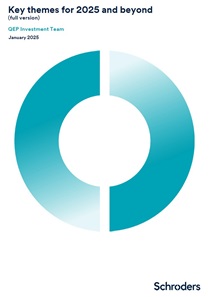by David Philpotts, Head of QEP Strategy and Equity Solutions, QEP Investment Team; and Lukas Kamblevicius, Co-Head of QEP Investment Team
Introduction
Lots of things could have gone wrong in 2024 but ultimately didn’t. Instead, cautious strategists were continually forced to rachet up their market forecasts, as US equities didn’t just climb a wall of worry but charged up it. Whilst there were some wobbles along the way, mostly attributed to uncertainty about the Federal Reserve (Fed), the S&P 500 posted another year of 20%+ returns. This is a feat that has only been achieved in back-to-back years three times in the past century, the last being in the late 1990s. History suggests that this is not necessarily a warning sign as the average return in subsequent years was positive in two out of the three instances. After failing to predict strong gains last year, US equity strategists are clearly sticking to this playbook with the average forecast from the major wall street banks around +10% for 2025.
Last year should have been a good one for stock pickers as there was something for everyone, particularly since the correlation of stock performance dropped to its lowest level in 25 years. However, the dominance of the “Magnificent-7” (Mag-7) led to a highly skewed outcome with only 20% of actively managed mutual funds and ETFs benchmarked against the US outperforming, not dissimilar to 2023. Value managers particularly struggled to find ways to hedge their inability to own the big index stocks. A more appropriate benchmark may be whether they beat the average stock, which according to the MSCI ACWI equally weighted index “only” rose by 5.9% in 2024, more than 12% behind its cap-weighted parent. Whether the current level of market concentration will persist or revert, as has historically happened, is one of the questions currently keeping active managers awake at night.
Our view on 2025 is not dissimilar to this time last year. Alongside the “known-knowns” such as the potential for a global tariff war, there will be plenty of risks to navigate and a wide range of outcomes is likely. Remaining diversified across the quality spectrum whilst not being overly bold on the big stocks (where fund guidelines permit) will be key. Our best guess is that it will be a better year for active management asthe dominance of the Mag-7 fades with good opportunities both further down the size spectrum and outside of the US. But, aside from an ongoing focus on inflation and what this means for central banks and bond yields, it is likely to be more of a bottom-up market. As such, we resist making sweeping assertions other than flagging the strong probability of higher volatility.
Against that backdrop, we outline some of the key themes to ponder as 2025 unfolds. Many of these themes are interrelated but the big question to address is whether US exceptionalism will continue and what this means for the Mag-7, market breadth and opportunities elsewhere.
Download the full paper
